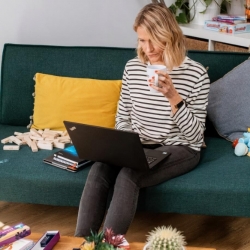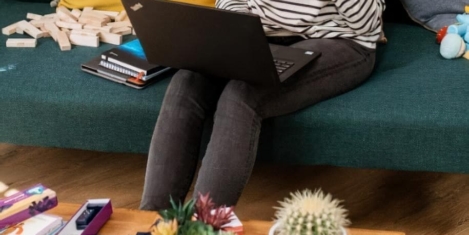March 2, 2021
Search Results for: employee experience
February 16, 2021
Investment in digital technology set to deliver £232bn boost to UK economy by 2040
by Jayne Smith • Business, News, Technology
 Investment in digital technology is set to increase UK GDP by £232bn (6.9 percent) in 2040, according to a new study by Virgin Media Business and the Centre for Economics and Business Research (CEBR). The research, which examines how more digital ways of working can support the UK’s economic recovery from Covid-19, claims investment in technology could boost the economy by £74bn in 2025. (more…)
Investment in digital technology is set to increase UK GDP by £232bn (6.9 percent) in 2040, according to a new study by Virgin Media Business and the Centre for Economics and Business Research (CEBR). The research, which examines how more digital ways of working can support the UK’s economic recovery from Covid-19, claims investment in technology could boost the economy by £74bn in 2025. (more…)
February 5, 2021
Line managers are the unsung heroes of white-collar work
by Jayne Smith • Business, News
 How good your line manager is makes the difference between an employee coping or struggling in lockdown. But too often line managers’ heroic efforts are not noticed by their employers, claims new report, titled Working under Covid-19 Lockdown: Transitions and Tensions. (more…)
How good your line manager is makes the difference between an employee coping or struggling in lockdown. But too often line managers’ heroic efforts are not noticed by their employers, claims new report, titled Working under Covid-19 Lockdown: Transitions and Tensions. (more…)
February 4, 2021
Older executives are coping with WFH challenges better than younger leaders
by Jayne Smith • Business, News, Working lives
 Senior executives aged 55+ have fared better than ‘millennial’ leaders (aged under 35) during the global pandemic. ABBYY’s COVID-19 Technology and Business Process Report claims that since the pandemic, executives of all ages have experienced huge challenges – in the UK alone, 81 percent of senior decision-makers struggled, particularly with collaborating with colleagues remotely (37 percent), motivation to work (29 percent) and productivity (26 percent). (more…)
Senior executives aged 55+ have fared better than ‘millennial’ leaders (aged under 35) during the global pandemic. ABBYY’s COVID-19 Technology and Business Process Report claims that since the pandemic, executives of all ages have experienced huge challenges – in the UK alone, 81 percent of senior decision-makers struggled, particularly with collaborating with colleagues remotely (37 percent), motivation to work (29 percent) and productivity (26 percent). (more…)
February 4, 2021
Working from home wellbeing outcomes vary enormously across groups
by Jayne Smith • Flexible working, News, Wellbeing
 With working from home set to continue for millions of UK workers, research by the Royal Society for Public Health (RSPH) claims that there are key health and wellbeing disparities between different groups of people who made the move to home working as a result of Covid-19. (more…)
With working from home set to continue for millions of UK workers, research by the Royal Society for Public Health (RSPH) claims that there are key health and wellbeing disparities between different groups of people who made the move to home working as a result of Covid-19. (more…)
February 3, 2021
COVID-19 is having an unequal impact on the mental health of workers
by Brendan Street • Comment, Wellbeing
 When the COVID-19 crisis hit the UK in March 2020, many commented that the virus didn’t discriminate and that its impact would be felt equally by everyone. However, as highlighted in Nuffield Health’s recent whitepaper, the mental health impact of the virus – rising from financial worries, anxiety around health and the direct impact of COVID-19 – has hit some groups harder than others. (more…)
When the COVID-19 crisis hit the UK in March 2020, many commented that the virus didn’t discriminate and that its impact would be felt equally by everyone. However, as highlighted in Nuffield Health’s recent whitepaper, the mental health impact of the virus – rising from financial worries, anxiety around health and the direct impact of COVID-19 – has hit some groups harder than others. (more…)
February 2, 2021
Working from home spells trouble for the careers of younger workers
by Helen Jamieson • Comment, Flexible working
 Lockdown meant that the choice to work from home was made for us. However, for many the decision to continue to do so post-lockdown will be a personal choice. The question we should all ask ourselves is, whether when we are outside of any lockdown restrictions, is working from home really a workplace revolution or simply an act of selfishness? For thousands of workers who’ve spent years of their lives commuting to offices that feel more like soul-less factories than inspiring and engaging workplaces, it’s no wonder that enforced work from home has proven popular. (more…)
Lockdown meant that the choice to work from home was made for us. However, for many the decision to continue to do so post-lockdown will be a personal choice. The question we should all ask ourselves is, whether when we are outside of any lockdown restrictions, is working from home really a workplace revolution or simply an act of selfishness? For thousands of workers who’ve spent years of their lives commuting to offices that feel more like soul-less factories than inspiring and engaging workplaces, it’s no wonder that enforced work from home has proven popular. (more…)
February 2, 2021
Staff mental health identified as key challenge in 2021
by Jayne Smith • News, Wellbeing, Working culture
 As a new year comes into view, many SMEs in the UK are concerned about the mental health of their staff as much as their ability to drive revenue, new research claims. The new survey conducted by Hiscox, asked 1,000 SME business decision-makers from across the UK about their experiences during 2020 and their subsequent outlook into 2021. (more…)
As a new year comes into view, many SMEs in the UK are concerned about the mental health of their staff as much as their ability to drive revenue, new research claims. The new survey conducted by Hiscox, asked 1,000 SME business decision-makers from across the UK about their experiences during 2020 and their subsequent outlook into 2021. (more…)
February 1, 2021
Burnt out remote workers need more help than they are getting
by Karen Plum • Comment, Flexible working, Wellbeing
 There’s no question that many people now, feeling the weight of lockdown 3 and with no clear view on the timing of any sort of ‘return to normal’, are finding it tough to stay motivated. Many are burnt out. We can gain some insight into what is going on for many individuals by way of neuroscience, specifically how the brain works and how it copes with changing situations. (more…)
There’s no question that many people now, feeling the weight of lockdown 3 and with no clear view on the timing of any sort of ‘return to normal’, are finding it tough to stay motivated. Many are burnt out. We can gain some insight into what is going on for many individuals by way of neuroscience, specifically how the brain works and how it copes with changing situations. (more…)
January 28, 2021
Homeworkers “at risk” unless employers recognise duty of care
by Jayne Smith • Flexible working, News, Wellbeing
 A new generation of long-term homeworkers created by COVID-19 is at risk physically and mentally through inadequate employer support, claims research by EIZO. Employees are already feeling the negative effects of a home environment, often ill-equipped for the working day and EIZO warns there may be a rise in ‘Homeworking LOSERS’, or ‘Laptops On Sofas and Employment Rights Shelved’. (more…)
A new generation of long-term homeworkers created by COVID-19 is at risk physically and mentally through inadequate employer support, claims research by EIZO. Employees are already feeling the negative effects of a home environment, often ill-equipped for the working day and EIZO warns there may be a rise in ‘Homeworking LOSERS’, or ‘Laptops On Sofas and Employment Rights Shelved’. (more…)







 Progress for women in work could be back at 2017 levels by the end of this year as a result of the COVID-19 pandemic, according to analysis conducted for
Progress for women in work could be back at 2017 levels by the end of this year as a result of the COVID-19 pandemic, according to analysis conducted for 



















February 4, 2021
When business leaders open up about mental health, we all benefit
by Richard Goold • Comment, Wellbeing